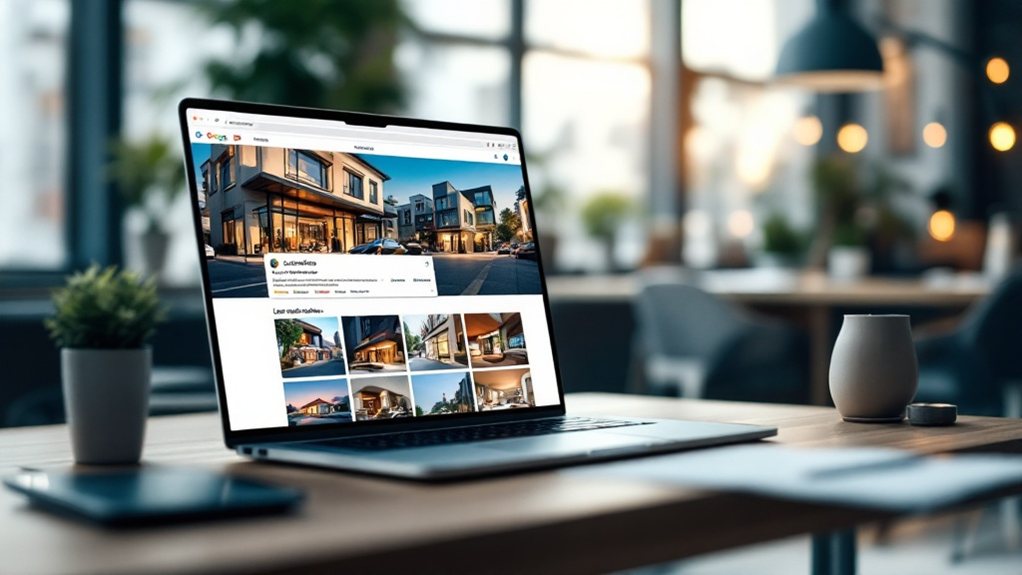As a local business, your location pages are essential for your copywriting strategy. They'll improve your local SEO, enhance the user experience, and build trust with potential customers. Craft compelling content that highlights your unique value proposition, local expertise, and high-quality visuals. Optimize each page for speed and visibility, while leveraging location-specific branding and keywords to drive more website traffic. Dive deeper to learn how to effectively manage and update your location pages for maximum impact.
Understanding the Purpose of Location Pages

Location pages are essential for businesses with multiple physical locations, as they provide specific information about each site. These dedicated web pages allow you to improve your local search engine optimization (SEO) and enhance the user experience for potential customers. By demonstrating your local expertise and tailoring content to each area, you build trust and credibility. Location pages also facilitate tracking the effectiveness of your local marketing efforts, enabling you to monitor traffic and conversions from each page. With search engines prioritizing local results, these pages are vital for establishing a strong online presence and reaching your target audience in the right geographic areas.
Crafting Compelling Location Page Content

Crafting compelling location page content is paramount for businesses with multiple physical locations. Clearly state your value proposition to set your business apart from local competitors. Highlight relevant local landmarks, events, or unique services to boost your location's relevance. Location-specific landing pages showcase local credibility. Leverage high-quality visuals and incorporate clear calls-to-action to engage your audience. Use storytelling techniques to showcase your connection to the area. Conduct thorough keyword research, competitor analysis, and audience insights to structure your content effectively. Optimize for user experience by ensuring readability, accessibility, and intuitive navigation. Build local authority through schema markup, backlinks, and partnerships. Regular updates and Google Business Profile integration will maintain your relevance in the community.
Optimizing Location Pages for Local SEO

As a business with multiple physical locations, optimizing your location pages for local SEO is crucial in standing out among local competitors. Ensure each page has unique content tailored to the specific area, and incorporate relevant local keywords. The goal of multi-location SEO is to increase qualified visitors from unbranded searches. Maintain consistent NAP information across all platforms, and leverage structured data markup to help search engines understand your location-specific details. Prioritize page speed and Core Web Vitals to enhance user experience. Embed Google Maps, showcase visual elements, and display clear contact information to engage your audience. Building local authority through community involvement, customer testimonials, and safety details can further solidify your credibility. Continuously track performance, gather feedback, and make data-driven adjustments to optimize your location pages.
Leveraging Location Pages for Brand Recognition
Your location pages don't just optimize for local SEO – they're powerful tools for building brand recognition. Centralized information across locations reinforces your identity, while consistent NAP data boosts credibility. Tailoring content to local audiences, yet maintaining a cohesive brand voice, creates a relatable presence. Aligning visuals with your overall aesthetics enhances recognition, while uniform service information supports a coherent brand image. By leveraging location-specific content, you can outperform competitors, increase visibility, and foster customer loyalty through targeted engagement. Your location pages are more than just local – they're essential for cultivating a strong, consistent brand identity.
Driving Website Traffic With Location Pages
While location pages are essential for boosting brand recognition, they also play a crucial role in driving website traffic. Crafting targeted, optimized location pages can attract local audiences and improve search engine rankings. Conduct thorough keyword research to identify relevant terms, then optimize each page for speed and user experience. Manage your local listings consistently to enhance visibility, and develop a content strategy that caters to local interests. Build high-quality backlinks from local sources to boost authority. Leverage reliable traffic metrics to make informed SEO decisions Use analytics tools like Google Analytics 4 to measure traffic, engagement, and the success of your marketing campaigns. Leverage location pages with SEO, PPC, social media, and email marketing strategies for a holistic approach to driving local traffic.
Maximizing ROI With Location Page Strategies
Optimizing your location page content, leveraging local targeting, and measuring key performance metrics are essential for maximizing the ROI of your location pages. Crafting unique, relevant content tailored to your local audience can drive increased visibility, engagement, and conversions. Additionally, strategic targeting and insightful analytics can further enhance the performance of your location pages. Let's explore how to effectively implement these strategies to boost the performance of your location pages.
Optimizing Page Content
To maximize the return on investment (ROI) from your location pages, it's essential to create a unique user experience tailored to each local audience. Craft unique, location-specific content to avoid SEO penalties, and highlight your local staff and services to build personal connections. Address relevant local issues to demonstrate your understanding of the community's needs. Optimize location pages to increase visibility in local search results by injecting hyperlocal content into generic copy to create unique pages for multiple locations. Cover niche local topics to attract targeted interest and increase relevance. Leverage location-specific visuals, staff photos, and interactive elements to engage users.
Leveraging Local Targeting
Capitalizing on the location-specific insights from the previous section, you can now leverage local targeting to maximize the return on investment (ROI) of your location pages. Incorporate targeted keywords that match local search intent, using tools like Semrush's Keyword Magic Tool. Embed Google Maps to enhance user experience and local rankings. Personalize CTAs with regional offers, promotions, and a sense of urgency to drive conversions. Localize your URL structure, page titles, and meta tags to improve visibility. Uniquely craft location-specific content and incorporate regional imagery to build trust. Showcase social proof and community involvement to reinforce your local presence. Optimizing location pages for local SEO is crucial for attracting targeted traffic and improving visibility in search results. Leveraging these strategies will help you connect with your target audience and drive impactful results.
Measuring Performance Metrics
Measuring the performance of your location pages is crucial for maximizing their return on investment (ROI). Track key metrics like page views, conversion rates, and time on page to identify popular pages and areas for improvement. Leverage user feedback tools and A/B testing to optimize elements driving conversions. Measuring and tracking the right KPIs is essential for managing and improving local SEO performance. Remember to:
- Regularly update location page content to maintain relevance
- Utilize Google Analytics to uncover geo-specific user behavior
- Refine keywords to align with shifting customer intent
Differentiating Location Pages by State, City, and Neighborhood
Differentiation by state is a crucial aspect of crafting effective location pages. Include local keywords, use state names in headings, and optimize URLs with state information. Highlight geographically relevant details and showcase service coverage areas through maps. For city-level differentiation, incorporate city-specific keywords, tailor content to local services and the community, and optimize URLs with city names. At the neighborhood level, emphasize unique selling points, partner with local businesses, and integrate Google Maps to connect with the community. Maintain consistent branding, conduct thorough keyword research, and regularly update location pages to keep content fresh and relevant. Additionally, emphasize regional specialties and products to further distinguish location pages.
Highlighting Services Across a Service Area
Highlighting the specific services you offer across your service area is crucial for enhancing local SEO and targeting geographically relevant keywords. By customizing your content with geographic markers, you can better cater to the needs of your local audience. Consider these strategies:
- Incorporate regional events or cultural references to increase the relevance of your content.
- Leverage unique content for each service area to avoid duplicate content penalties from search engines.
- Embed Google Maps to improve user experience and demonstrate your business's credibility within the local community.
These tactics will help you optimize your location pages, boost your visibility in search, and ultimately drive more conversions from your target audience.
Managing Multi-Location Pages Effectively
Consistency is key when managing multiple location pages. Optimize each page for local visibility by tailoring the content and leveraging structured data. Streamline your website structure to centralize location pages and maximize SEO benefits.
Coordinating Content Consistency
Maintaining consistent content across multiple location pages is crucial for establishing a cohesive brand identity and enhancing user experience. To achieve this, consider the following strategies:
- Standardize page layouts and URL structures to reinforce your brand's visual identity and facilitate seamless navigation.
- Centralize content management and leverage automation tools to streamline updates and minimize duplication.
- Regularly review and update content to ensure accuracy and relevance, reflecting any changes in services or promotions.
Optimizing Local Visibility
Optimizing location pages is crucial for establishing a strong local presence and driving visibility in relevant searches. Ensure each page features location-specific details like business hours, contact info, and images. Strategically incorporate local keywords in the content, titles, and meta descriptions to enhance search ranking. Actively manage reviews and ratings, as they significantly impact local SEO. Technically optimize pages for search engines by implementing schema markup, ensuring mobile-friendliness, and tracking technical errors. Additionally, maintain consistent listings and citations across local directories to reinforce your business's legitimacy. By following these best practices, you can improve the online discoverability of your multi-location enterprise.
Streamlining Website Structure
When managing a multi-location business, streamlining your website structure is crucial for providing an effortless user experience. Maintain a consistent, logical URL structure that reflects your website's hierarchy, and create a "locations" hub page to simplify access to all your business locations. Ensure your website is responsive, with a clean and straightforward navigation menu that accommodates various devices and screen sizes.
- Implement breadcrumbs in your URLs to indicate hierarchy and improve readability.
- Leverage location-specific content and schema markup to enhance SEO and customer convenience.
- Avoid separate websites for locations to maintain brand consistency and cost-effective management.
Maintaining and Updating Location Page Content
Keeping your location pages up-to-date and relevant is crucial, as your potential customers will often rely on this information to find and connect with your business. Use evergreen content where possible, but update hours, seasonal offers, and other time-sensitive details regularly. Ensure your pages are mobile-friendly and monitor their performance, making improvements as needed. Schedule periodic reviews of customer feedback and update your content accordingly. By maintaining a fresh, accurate, and user-friendly presence for each location, you'll build trust, enhance the customer experience, and improve your local search visibility.
